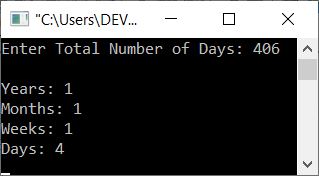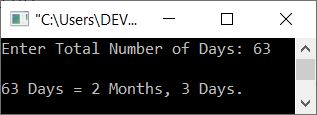- C++ Programming Examples
- C++ Programming Examples
- C++: Hello World
- C++: Get Input
- C++: Print Integer
- C++: Add two numbers
- C++: Add, Sub, Multiply, Div
- C++: Add Digits
- C++: Find Average and Percentage
- C++: Find Arithmetic Mean
- C++: Sum of n Natural Numbers
- C++: Sum of n Numbers
- C++: Square's Area and Perimeter
- C++: Rectangle's Area and Perimeter
- C++: Triangle's Area and Perimeter
- C++: Area and Circumference
- C++: Find Simple Interest
- C++: Fahrenheit to Celsius
- C++: Celsius to Fahrenheit
- C++: Print Prime Numbers
- C++: Reverse a Number
- C++: Swap Two Numbers
- C++: Print Multiplication Table
- C++: Find Factorial of a Number
- C++: Find Factors of a Number
- C++: Find HCF and LCM
- C++: Create a Calculator
- C++: Count Digits in a Number
- C++: First and Last Digit Sum
- C++: Product of Number Digits
- C++: Sum of Squares of Digits
- C++: Interchange Digits of Number
- C++ if-else Programs
- C++: Check Even or Odd
- C++: Check Prime or Not
- C++: Check Alphabet or Not
- C++: Check Vowel or Not
- C++: Check Leap Year or Not
- C++: Check Reverse equals Original
- C++: Check Perfect Number
- C++: Check Palindrome or Not
- C++: Check Armstrong or Not
- C++: Divisibility Test
- C++: Find Labor Wage
- C++: Find Discounted Price
- C++: Find Shipping Charge
- C++: Find Telephone Bills
- C++: Calculate Student Grade
- C++: Largest of Two Numbers
- C++: Largest of Three Numbers
- C++ Number Conversion
- C++: Decimal to Binary
- C++: Decimal to Octal
- C++: Decimal to Hexadecimal
- C++: Binary to Decimal
- C++: Binary to Octal
- C++: Binary to Hexadecimal
- C++: Octal to Decimal
- C++: Octal to Binary
- C++: Octal to Hexadecimal
- C++: Hexadecimal to Decimal
- C++: Hexadecimal to Binary
- C++: Hexadecimal to Octal
- C++ Pattern Programs
- C++: Pattern Programs
- C++: Print Diamond Pattern
- C++: Print Floyd's Triangle
- C++: Print Pascal's Triangle
- C++ Array Programs
- C++: 1D Array Program
- C++: Linear Search
- C++: Binary Search
- C++: Largest Element in an Array
- C++: Smallest Element in an Array
- C++: Find Second Largest Element
- C++: Find Second Smallest Element
- C++: Sum of All Elements
- C++: Multiply All Elements
- C++: Element in Even Position
- C++: Element in Odd Position
- C++: Print Even Numbers in Array
- C++: Print Odd Numbers in Array
- C++: Count Even or Odd Numbers
- C++: Sum of Even or Odd Numbers
- C++: Count Positive, Negative, Zero
- C++: Reverse an Array
- C++: Insert an Element
- C++: Delete an Element
- C++: Merge two Arrays
- C++: Bubble Sort
- C++: Selection Sort
- C++: Insertion Sort
- C++: Common Elements
- C++: 2D Array Programs
- C++: Add Two Matrices
- C++: Subtract Two Matrices
- C++: Transpose Matrix
- C++: Multiply Two Matrices
- C++: 3D Array Programs
- C++ String Programs
- C++: Print String
- C++: Find String Length
- C++: Compare Two Strings
- C++: Copy String
- C++: String Concatenation
- C++: Reverse a String
- C++: Delete Vowels from a String
- C++: Delete a Word from a String
- C++: Count Characters in a String
- C++: Count Words in a String
- C++: Frequency of Words
- C++: Remove Spaces from Strings
- C++: Sort a String
- C++: Uppercase to Lowercase
- C++: Lowercase to Uppercase
- C++: Swap Two Strings
- C++: Check the Anagram or Not
- C++: Capitalize All Words in a String
- C++: Get Numbers from a String
- C++ File Programs
- C++: Read a File
- C++: Write Content to a File
- C++: Append Data to a File
- C++: Read and Display File
- C++: Copy a File
- C++: Merge Two Files
- Count Characters in a File
- C++: Capitalize Every Word
- C++: List Files in Directory
- C++: Delete a File
- C++: Encrypt and Decrypt a File
- C++ Misc Programs
- C++: Print ASCII Value
- C++: Add Binary Numbers
- C++: Generate Random Numbers
- C++: Print a Smiling Face
- C++: Days into Years and Months
- C++: Add Two Numbers using Pointer
- C++: Print Fibonacci Series
- C++: Generate Armstrong Numbers
- C++: Find nCr and nPr
- C++: Get IP Address
- C++: Print Date and Time
- C++: Shutdown and Restart Computer
- C++ Programming Tutorial
- C++ Tutorial
C++ Program to Convert Days into Years, Months, Weeks, and Days
This article provides some programs in C++ that are used to convert the total number of days entered by the user at run-time into years, months, weeks, and days.
For example, if the user enters 406 (the total number of days) as input, the output will be 1 year, 1 month, 1 week, and 4 days. Here is the conversion that shows how 406 days get converted into years, months, weeks, and days:
406 days = 1 (1*365) + 1 (1*30) + 1 (1*7) + 4
= 1 (year) + 1 (month) + 1 (week) + 4 (days)
= 1 (1*365) + 1 (1*30) + 1 (1*7) + 4
= 365 + 30 + 7 + 4
= 395 + 11
= 406
The question is, "Write a C++ program that receives the total number of days as input and converts and prints given days into their respective years, months, weeks, and days." The program given below is the answer to this question:
#include<iostream> using namespace std; int main() { int tot, days, weeks, months, years; cout<<"Enter Total Number of Days: "; cin>>tot; years = tot/365; months = (tot%365)/30; weeks = ((tot%365)%30)/7; days = ((tot%365)%30)%7; cout<<"\nYears: "<<years<<endl; cout<<"Months: "<<months<<endl; cout<<"Weeks: "<<weeks<<endl; cout<<"Days: "<<days<<endl; cout<<endl; return 0; }
The snapshot given below shows the initial output produced by the above C++ program on converting the total number of days into years, months, weeks, and days:

Now supply the input, say 406 as the total number of days, and press the ENTER key to see the output as shown in the snapshot given below:

When the user enters 406 days into the above program, the tot variable is initialized. Now the statement:
years = tot/365;
Because the years variable is of the int type, it returns 1. Therefore, 1 gets initialized to years. And the statement:
months = (tot%365)/30;
(tot%365)/30 equals (406%365)/30 equals (41)/30 equals 1. Therefore, 1 gets initialized to months. And the statement:
((tot%365)%30)/7;
((tot%365)%30)/7 equals ((406%365)%30)/7 equals ((41)%30)/7 equals (11)/7 equals 1. Therefore, 1 gets initialized to weeks. And the last statement is:
((tot%365)%30)%7
((tot%365)%30)%7 equals ((406%365)%30)%7 equals ((41)%30)%7 equals 11%7 equals 4. Therefore, 4 gets initialized to days. In this way, the calculation goes like this, or the evaluation of all four conversion statements goes like this.
Let's replace the above program with the one given below. This program provides a poor user experience because the output gets printed in one line instead of multiples as in the previous program
#include<iostream> using namespace std; int main() { int tot, days, weeks, months, years; cout<<"Enter Total Number of Days: "; cin>>tot; years = tot/365; months = (tot%365)/30; weeks = ((tot%365)%30)/7; days = ((tot%365)%30)%7; cout<<endl<<tot<<" Days = "; cout<<years<<" Years, "; cout<<months<<" Months, "; cout<<weeks<<" Weeks, and "; cout<<days<<" Days."; cout<<endl; return 0; }
Here is its sample run with user input of 413 as the number of days:

Still, the program appears strange because 1 years must be converted to 1 year (without the s). Let's completely modify the above program:
#include<iostream> using namespace std; int main() { int tot, days, weeks, months, years; cout<<"Enter Total Number of Days: "; cin>>tot; years = tot/365; months = (tot%365)/30; weeks = ((tot%365)%30)/7; days = ((tot%365)%30)%7; cout<<endl<<tot<<" Days = "; if(years>1) cout<<years<<" Years, "; else { if(years==1) cout<<years<<" Year, "; } if(months>1) cout<<months<<" Months, "; else { if(months==1) cout<<months<<" Month, "; } if(weeks>1) cout<<weeks<<" Weeks, and "; else { if(weeks==1) cout<<weeks<<" Week, and "; } if(days>1) cout<<days<<" Days."; else { if(days==1) cout<<days<<" Day."; } cout<<endl; return 0; }
Here is its sample run with user input of 63 days:

As you can see from the above program's sample run, if any term like year, month, week, or day gets equal to 0, then the output of that term is not shown.
« Previous Program Next Program »